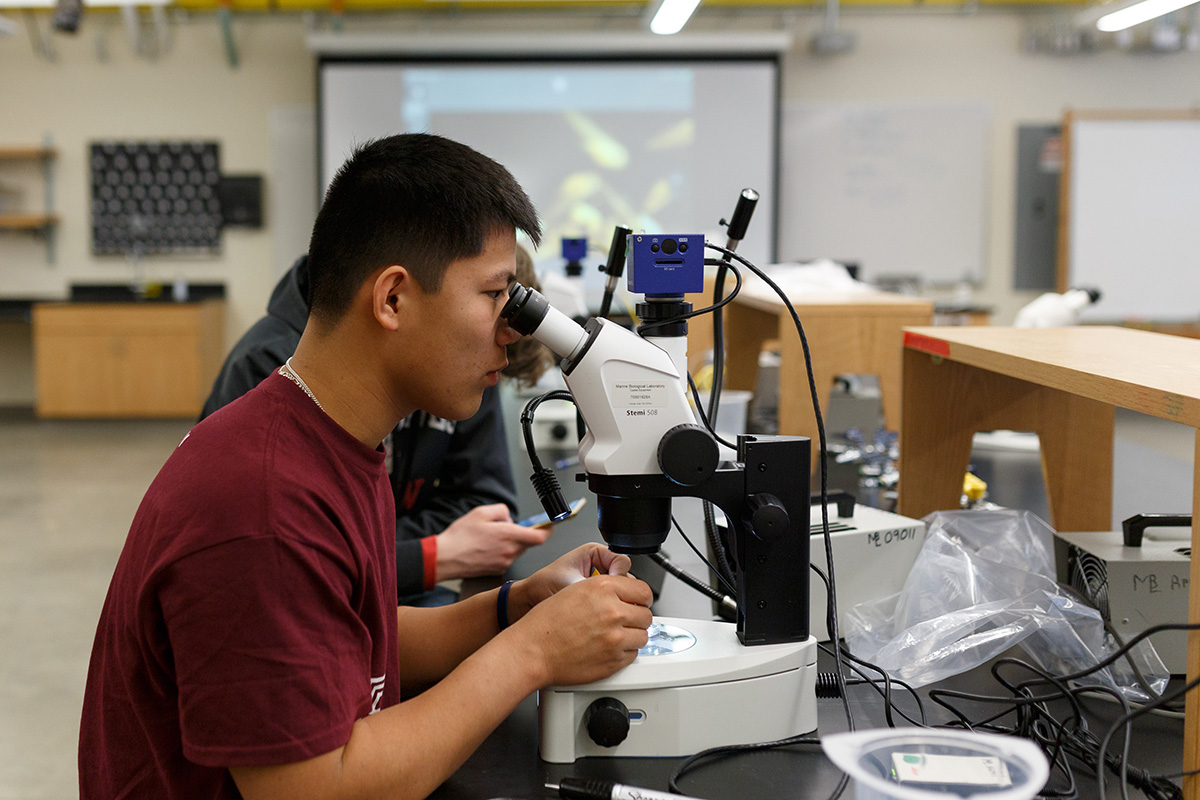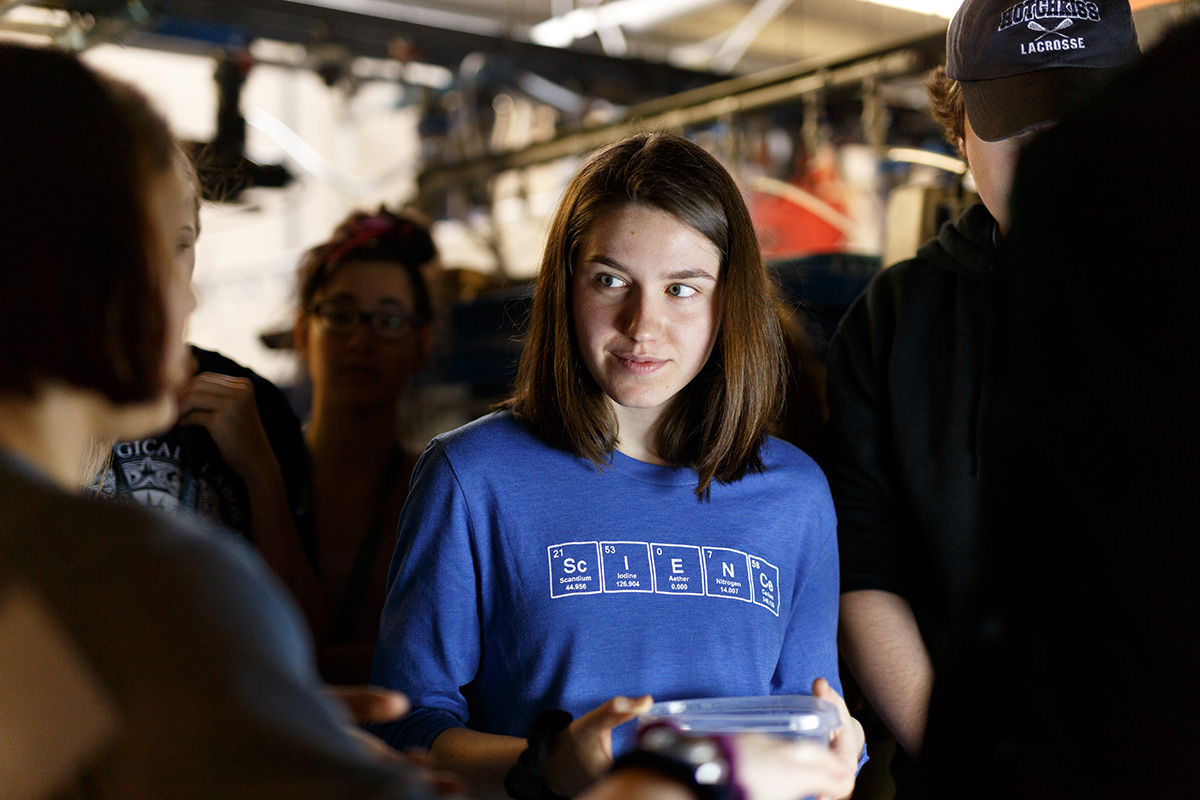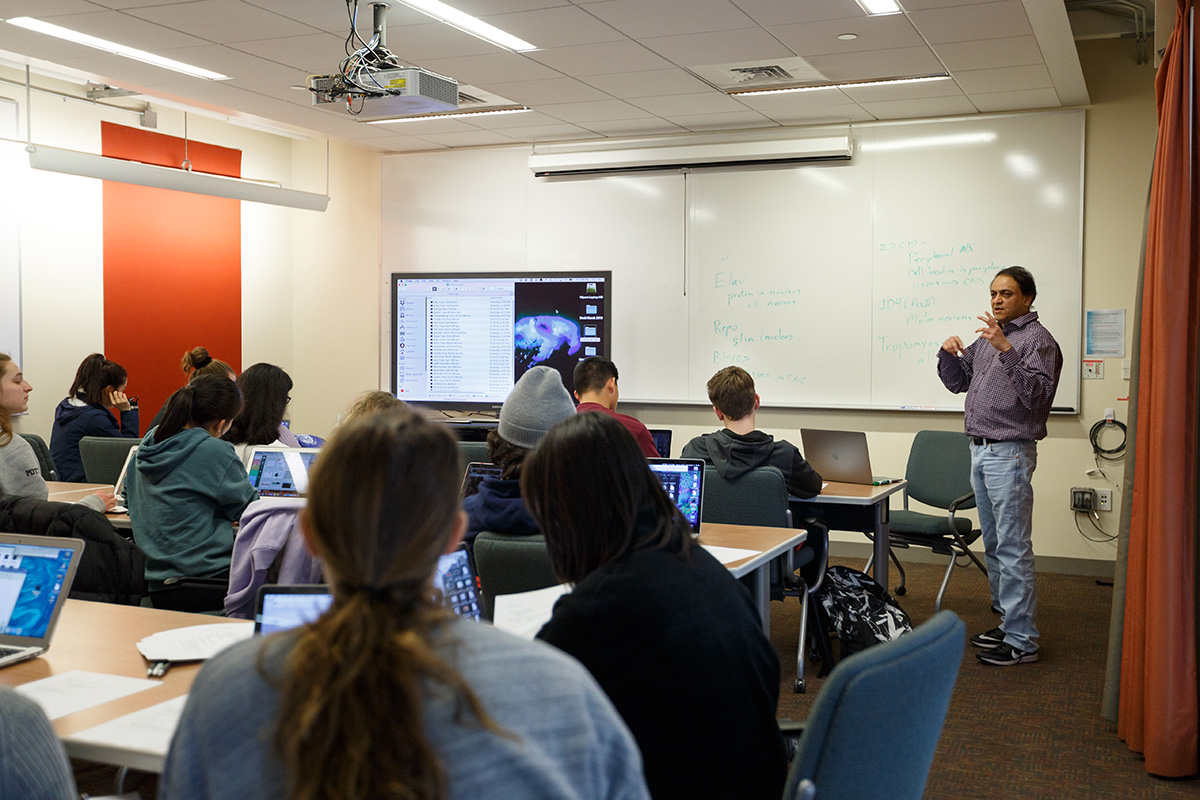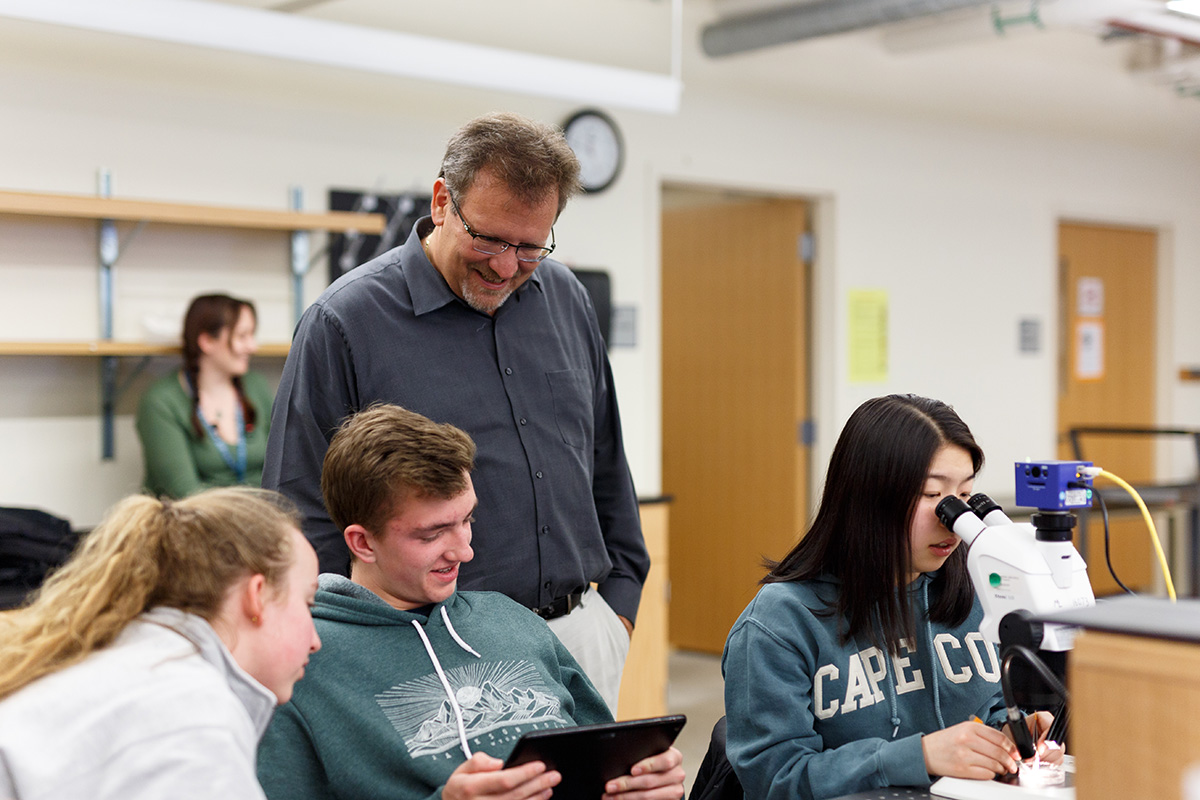In New MBL Course, High-School Students Envision a Future in Science

Igniting the flame of scientific curiosity is one of the Marine Biological Laboratory’s greatest strengths, honed over a century of immersing students in its research discovery courses. In partnership with the University of Chicago’s College of Admissions, MBL is extending its educational and inspirational excellence into the high-school realm.
The new MBL Secondary Education Program shows high-school students how to undertake real biological research projects, using cutting-edge techniques usually reserved for college or graduate students.
“This six-day program gives high-school students a unique opportunity for hands-on research,” said Nipam Patel, director of the Marine Biological Laboratory.
 Justin Simon from Tabor Academy in the March Secondary Education Program at MBL. Credit: Dee Sullivan
Justin Simon from Tabor Academy in the March Secondary Education Program at MBL. Credit: Dee SullivanEvery summer, the MBL’s advanced research courses flood the campus with hundreds of graduate students and post-doctoral scientists. But from September to May, MBL’s top-of-the-line educational laboratories have been under-utilized.
“So, we thought, ‘How can we use our facilities year-round and expand our mission at the same time so we can reach the next generation of students?’” said Alison Crawford, chief of staff to Patel who was charged to help launch the new program.
The MBL piloted the program last December and offered it again in March, with participation by 43 students and 10 teachers from St. Anne’s‐Belfield School (Charlottesville, Va.), Phillips Exeter Academy (Exeter, N.H.), Hotchkiss School (Lakeville, Conn.), Tabor Academy (Marion, Mass.), and Winsor School (Boston, Mass).
 Gabrielle Jarrett from The Hotchkiss School in the MBL’s Marine Resources Center. Credit: Dee Sullivan
Gabrielle Jarrett from The Hotchkiss School in the MBL’s Marine Resources Center. Credit: Dee SullivanDepth and Diversity
A team at MBL developed the Secondary Education Program with input from an advisory board of high-school teachers, to ensure the experience met curriculum expectations. The board and MBL team decided to focus the courses on important trends in scientific research in which MBL faculty have expertise.
“You can think of it as an introduction to the greatest hits of the MBL,” said Patel. “The students learned some of the things that we're especially good at.”
Over the course of a week, students were immersed in biological and ecological research. They used the gene-editing technology CRISPR-Cas9 to create albino frog tadpoles. They studied structural color in butterfly wings, imaged fly embryos on a confocal microscope and created 3D video reconstructions from image datasets—such as this one created by Isabella Frank, a student from St. Anne’s-Belfield School. For the December course, when the weather permitted, the students waded into local salt marshes to collect water samples and evaluate their nitrogen levels. They also collected marine specimens from waters just outside MBL’s doors and sequenced the specimens’ genetic information using nanopore technology.
“I loved the diversity of what we did,” wrote one of the students in a post-program survey. “We saw a variety of labs and roles within the facility. Also, everyone was really helpful and nice. They seemed to be really passionate about their jobs and that made our experience more exciting.”
 MBL Director Nipam Patel teaches a unit on biological imaging in the March program. Credit: Dee Sullivan
MBL Director Nipam Patel teaches a unit on biological imaging in the March program. Credit: Dee SullivanPatel and team have plans to evolve the program, increasing the diversity of classes offered and giving students the chance to specialize within their interest areas.
“We will increasingly include courses that are focused on a narrower range of topics,” Patel said. “So we might offer a course next year on coral biology and climate change, or on ocean phytoplankton biology, so the students have more time to work on a particular project.”
Considering a Career in Science
Exposing teens to what science looks like as a job is important. Many high-school students do not understand the range of career options available to them when studying science. The Secondary Education Program participants met with graduate teaching assistants at MBL, and heard first-hand how people not much older than themselves are pursuing careers in biology and science.
“The graduate students and research assistants were incredible,” commented another student in a survey. “As much as I learned about the biology, the real take-away from this program for me was what it’s like to work as a scientist in a lab and seeing such a large range of work that I could end up doing.”
“It's a great time to give students an opportunity to see what their choices are,” said Patel. “Even if they choose not to continue on in biology or even science at all, that's still fine, because what they learn here will still help create a really well-educated public to help make decisions.”
 From left seated, Rose Coviello from Phillips Exeter, Clay Glovier from The Hotchkiss School and Yuka Masamura from The Hotchkiss School with MBL Senior Scientist Marko Horb, one of the faculty in the Secondary School Program. Credit: Dee Sullivan
From left seated, Rose Coviello from Phillips Exeter, Clay Glovier from The Hotchkiss School and Yuka Masamura from The Hotchkiss School with MBL Senior Scientist Marko Horb, one of the faculty in the Secondary School Program. Credit: Dee SullivanThe students also appreciated the ability to connect with the expert faculty. They felt welcomed and comfortable in a situation that had the potential to be intimidating.
“The faculty were supportive and went with the flow,” said Crawford. “Some of the St. Anne's students emailed some of our faculty after saying how much they appreciated being able to talk to scientists.”
The pilot has so far been offered to independent high schools. As the program becomes more established, MBL plans to identify funding to cover tuition for students from public and charter schools.
“I loved pretty much everything about this intensive,” said another student. “The faculty and staff were so invested in our success and I felt that this was an amazing opportunity for me to explore my interests and learn for the sake of learning.”
Homepage photo: In their teaching lab at MBL, Henry Lagasse, far left, and Genevieve Carchidi, far right, from Phillips Exeter Academy take a break with The Winsor School students (from left) Erica Sahin (seated), Rani Balakrishna, Jane Hwang, Kayla Springer, and Alexandra Lee. Credit: Dee Sullivan
—###—
The Marine Biological Laboratory (MBL) is dedicated to scientific discovery – exploring fundamental biology, understanding marine biodiversity and the environment, and informing the human condition through research and education. Founded in Woods Hole, Massachusetts in 1888, the MBL is a private, nonprofit institution and an affiliate of the University of Chicago.